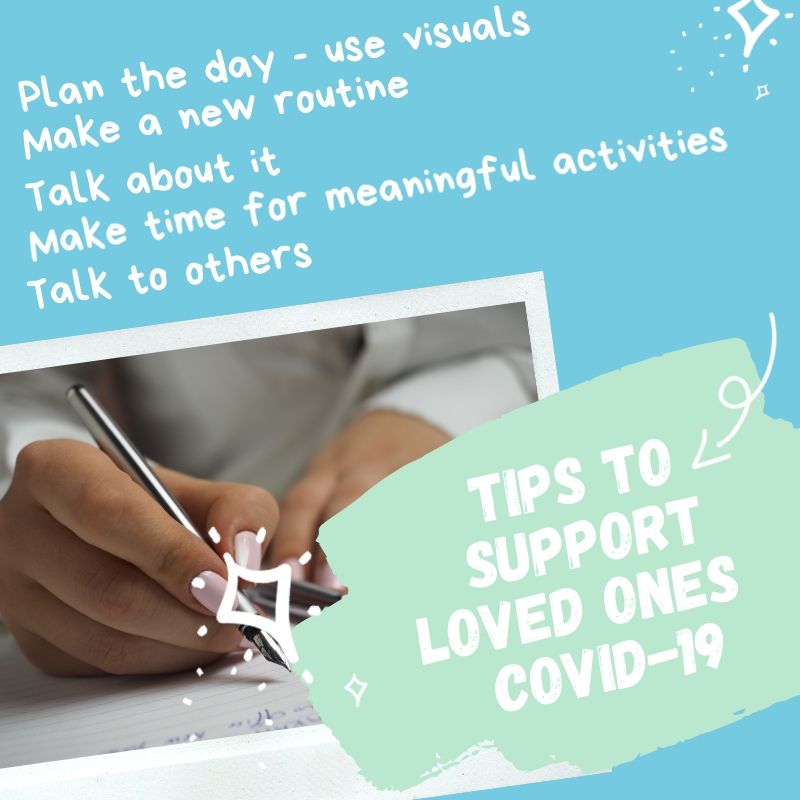Caring for an older adult at home during COVID-19 comes with new challenges, even for experienced caregivers. Try some of the tips below to change things up for the better!
- Talk about it: Have a conversation to find out what your loved one knows and feels about the current COVID-19 situation. Feeling heard helps reduce stress.
- The goal is to provide a fear-free space to educate and reassure your loved one about the virus. Depending on your loved one, it may be best to save your own fears and concerns about COVID-19 for other family members or close friends.
- Provide some general education about COVID-19
- A “pandemic” is an illness that has spread across a country or worldwide.
- COVID-19 is an illness that typically results in fever, cough and shortness of breath
- COVID-19 is easily spread from one person to another
- What can we do to protect ourselves and others?
- Practice social distancing. Reassure your loved one why they are staying home. Staying home reduces the opportunity for droplets from another person to get on your loved ones’ hands, face, eyes, mouth and nose.
- Encourage washing of hands with soap for 20 seconds prior to meals, after using the restroom, and throughout the day
- Try not to touch your face.
- Plan the day: Help your loved one develop some structure for the day.
- Make the plan visual. Use a dry erase board, print it out on paper, put it where they can see it easily.
- Make sure the plan includes your loved one’s preferred and meaningful activities.
- Presenting 1-3 activities on a schedule can be attainable and help people feel productive. More activities can be added throughout the day as needed.
- Consider these ideas: TV shows, movies, coloring, crafts, puzzles, talking on the phone, listening to the radio, writing letters, looking at old photos, reminiscing about old times, chair exercise or walking.
- Include regular activities like hygiene, grooming, a few chores (if able), meals and snacks in the schedule. These activities can be a foundation for wellness and provide a sense of stability.
- Checking in throughout the day can encourage a feeling of connection and productivity.
- Connect with friends and other family members: make time to stay connected to others who can give you some support via the phone, or in a letter. If your loved one is part of the LifeCircles PACE program give our team a call. We are here for you to problem solve or just be a listening and encouraging ear.
- Contact your loved one’s medical provider if you see concerning changes: So much can be done over the phone right now. If you have noticed a change in your loved one’s behavior or condition, reach out to your medical team. Doctor’s offices are working hard to keep frail older adults out of emergency rooms and hospitals right now. If it isn’t an emergency, work with them to help your loved one get support at home, and not risk exposure to the virus. The LifeCircles PACE medical team is available 24/7 by phone for participants in our program. Participant’s who use our Muskegon Center can reach us at 231-733-8686. Participants who use our Holland Center can reach us at 616-582-3100.
- Carve out time for yourself: Find a moments to listen to your favorite music, to journal about your feelings, take a bubble bath, or go for a walk, if you can. This is a marathon, not a sprint, so do make time to do the things that help you feel refreshed.
- Give yourself and your loved one grace: This is a trying time. We are all struggling, and will all have challenging moments. Try to step back and do some deep breathing. If you can, find the humor in the moment and have a big belly laugh. If you have a bad day, or snap at your loved one, don’t beat yourself up. Think about what caused the situation, and what you can do differently next time. Be gentle and kind. None of us have been here before.
- Don’t believe everything you see or hear: There are many ways false information spreads, and causes undue worry. Seek out reputable sources when educating yourself about the Coronavirus.
- Some options:
- State of Michigan information regarding the Coronavirus: www.michigan.gov/coronavirus/
- Center for Disease Control provides user friendly education: www.cdc.gov/coronavirus/2019-ncov/index.html
- Some options:

